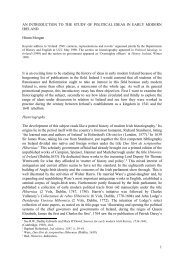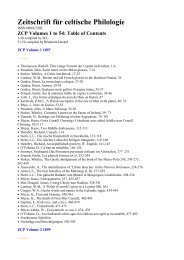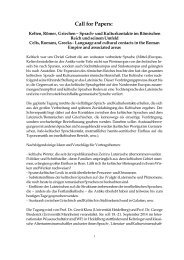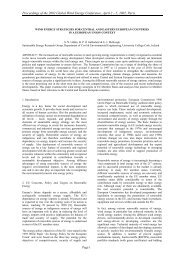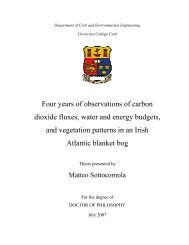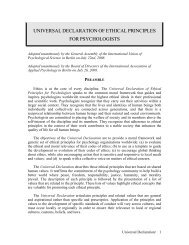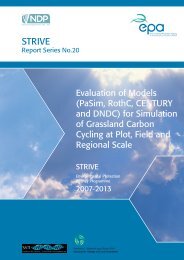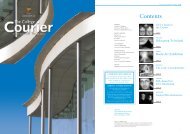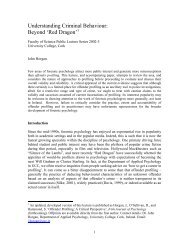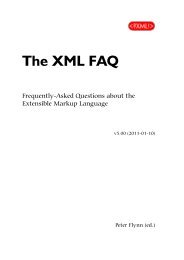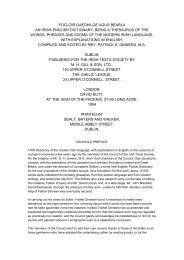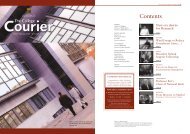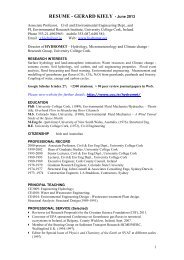2013 - University College Cork
2013 - University College Cork
2013 - University College Cork
You also want an ePaper? Increase the reach of your titles
YUMPU automatically turns print PDFs into web optimized ePapers that Google loves.
foods, marine materials for medical applications and renewable ocean energy as key. Marine research<br />
will also be strongly represented under the Horizon 2020 programme. Almost €4.7 billion<br />
has been proposed for the Challenge “Food security, sustainable agriculture, marine and maritime<br />
research, and the bioeconomy.” The Europe 2020 Strategy’s call for a bioeconomy as a key element<br />
for smart and green growth in Europe will support further research investments in marine food<br />
and bio-based products. It is within this context, that marine research in UCC positions itself to<br />
prosper and provide a fundamental benefit to the nation and Europe.<br />
WHO WE ARE<br />
UCC is at the forefront of maritime research through research, teaching and practice across several<br />
internationally recognised Institutes, Centres and Research Clusters including the Environmental<br />
Research Institute (ERI), one of three flagship research Institutes at the <strong>University</strong>, established as<br />
an inter-disciplinary research institute in 2000 to facilitate and support environmental, marine and<br />
energy based research at UCC. It brings together expertise in the biological, chemical and environmental<br />
sciences as well as environmental engineering, energy and environmental law. Contributors<br />
to the Marine Pillar include the:<br />
– Aquaculture & Fisheries Development (AFDC)<br />
– Aquatic Services Unit (ASU)<br />
– Coastal and Marine Research Centre (CMRC)<br />
– Department of Law<br />
– Hydraulics and Maritime Research Centre (HMRC)<br />
– Marine Biotechnology Centre (MBC)<br />
– School of Biological Earth & Environmental Sciences (BEES)<br />
– School of Geography & Archaeology: the Human Environment<br />
– Sustainable Energy Research Group (SERG)<br />
WHAT WE ACHIEVE<br />
UCC has a strong track record in knowledge and technology transfer and involvement with industry.<br />
In the area of Marine Biotechnology UCC has received significant funding and has developed<br />
technology which led to the establishment of the UCC aquaculture start-up, Gourmet Marine, and<br />
also the discovery and patenting of anti-infective bioactive compounds resulting from the Beaufort<br />
Marine Biodiscovery programme funded by the Marine Institute. We also have several industrially<br />
funded projects especially in the Marine Offshore Renewables sector.<br />
International cooperation is essential in a rapidly changing world where challenges extend beyond<br />
a particular research field, region or country. Preserving existing partnerships and developing new<br />
ones, particularly in areas related to the great societal challenges, like climate change, energy or food<br />
security is extremely important in strengthening national capacity and enabling Irish researchers<br />
to remain at the forefront of the knowledge based economy. It can also open up new markets for a<br />
range of Irish developed knowledge-based products and services.<br />
The EU Framework Programme for Research (FP7: 2007-<strong>2013</strong>), continues to be a major source<br />
of competitive R&D funding for Irish marine researchers. From 2007 to 2010, 43 Irish marine<br />
research groups, including knowledge-based SMEs, were involved in 64 FP7 collaborative projects<br />
and drawing down funds in excess of €23.7 million. In 2011, a further 21 marine projects with Irish<br />
participation were approved subject to successful contract negotiation.<br />
Introduction<br />
5



